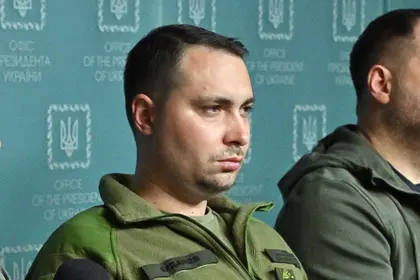The head of the Main Intelligence Directorate of Ukraine, Kyrylo Budanov, speaking in an exclusive interview with Reuters, said that on June 24, during the failed rebellion, Wagner mercenaries had reached the Voronezh-45 base in Russia, where nuclear weapons are reportedly stored. However, the White House and other US agencies familiar with nuclear security say such a breach is unlikely and would not corroborate the report.
Videos and interviews with residents provided evidence that some of the mercenaries veered off the highway towards the fortified Russian army base en route to Moscow.
JOIN US ON TELEGRAM
Follow our coverage of the war on the @Kyivpost_official.
Surveillance footage ceased approximately 100 kilometers from the Voronezh-45 nuclear base. So, there is no objective evidence of what happened within the next few hours in that area.
Budanov, however, claims that the rebels went far beyond that point, successfully breaching the base to acquire “small Soviet-era nuclear devices” to escalate their rebellion to some severe point.
“Because if you are prepared to fight until the last man standing, this is one of the facilities that significantly raises the stakes,” Budanov said.
According to Budanov, the Voronezh-45 base held a crucial stockpile of backpack-sized nuclear devices.
“This was one of the key storage facilities for these backpacks,” he said, adding that the only obstacle separating the rebels from the nuclear weapons cache was the door to the nuclear storage facility.

EU Transfers €1.5 Bln Raised From Russian Assets for Ukraine
“The doors of the storage were closed, and they didn’t get into the technical section,” he said.
A Kremlin insider with military ties has confirmed parts of Budanov’s account regarding the Wagner mercenaries. According to him, a Wagner group managed to enter a strategically important zone, causing concerns for the United States due to the presence of nuclear weapons. However, no further details were provided.
A source in Russian-occupied east Ukraine, familiar with the topic, said that the seizure of nuclear weapons is believed to have prompted successful negotiations and mediation efforts led by the President of Belarus, Alexander Lukashenko, who played a pivotal role in defusing the situation.
Still, the motivation behind the mercenaries’ retreat remains unknown.
However, doubts have emerged concerning Budanov’s statement, with American officials expressing reservations about the accuracy of the claims.
“We are not able to corroborate this report. We had no indication at any point that nuclear weapons or materials were at risk,” Adam Hodge, a representative of the White House National Security Council, responded to the allegations.
According to Matt Korda, a Senior Research Associate and Project Manager for the Nuclear Information Project at the Federation of American Scientists, breaching Russian nuclear security would be extremely difficult for ‘a non-state actor.’
“If you had a malicious actor who was able to get their hands on a nuclear weapon, they would find the weapons stored in a state of incomplete assembly,” he said.
“They would need to be completed by installing specialized equipment and then unlocking permissive action links, and in order to do that they would need the cooperation of someone from the 12th Directorate, responsible for protecting Russia’s nuclear arsenal.”
The 12th Chief Directorate of the Ministry of Defense (12 GU MO) has played a crucial role in both the former Soviet Union and, since 1991, the Russian Federation. As a department within the Russian Ministry of Defense, its primary responsibility lies in the secure management of the nation’s nuclear arsenal.
Tasked with an array of crucial duties, the 12th Directorate assumes responsibility for the safekeeping, technical maintenance, transportation, delivery, issuance, and disposal of the state's nuclear weapons.
The mutiny, initiated by Yevgeny Prigozhin, the founder of the Wagner Private Military Company, commenced on June 23 with a declared “march of justice” aimed at removing Russian Defense Minister Sergei Shoigu and Chief of the General Staff of the Armed Forces of the Russian Federation, Valery Gerasimov, from their positions.
Over the course of a day, the mercenaries seized control of Rostov and traversed several Russian regions, managing to shoot down six Russian army helicopters and one plane.
However, just shy of reaching Moscow, Prigozhin abruptly altered his course following negotiations with Belarussian President Alexander Lukashenko.
As per the agreement, the Wagner PMCs were ordered to return to their field camps, and all charges against Prigozhin were dropped, facilitating his relocation to Belarus.
You can also highlight the text and press Ctrl + Enter






